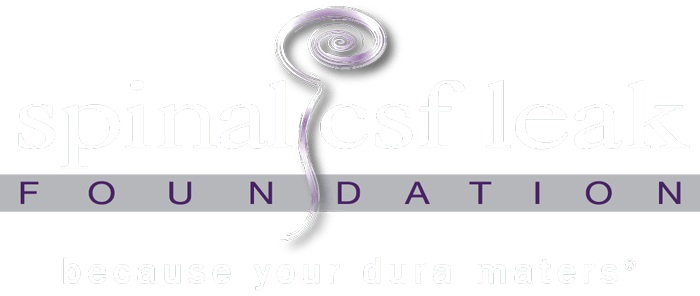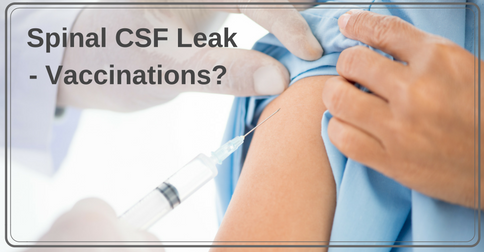In the ACIP (Advisory Committee on Immunization Practices) recommendations, pneumococcal vaccination is recommended for patients with “CSF leaks”, without distinguishing between cranial CSF leak with an anatomic barrier defect and increased infection risk, and spinal CSF leak without such an anatomic barrier defect. This is where the confusion arises for patients with spinal CSF leaks.
Here is the relevant section from ACIP:
ACIP Recommendations for PCV13 and PPSV23 Use
Adults with specified immunocompromising conditions who are eligible for pneumococcal vaccine should be vaccinated with PCV13 during their next pneumococcal vaccination opportunity.
Pneumococcal vaccine-naïve persons. ACIP recommends that adults aged ≥19 years with immunocompromising conditions, functional or anatomic asplenia, CSF leaks, or cochlear implants, and who have not previously received PCV13 or PPSV23, should receive a dose of PCV13 first, followed by a dose of PPSV23 at least 8 weeks later (Table). Subsequent doses of PPSV23 should follow current PPSV23 recommendations for adults at high risk. Specifically, a second PPSV23 dose is recommended 5 years after the first PPSV23 dose for persons aged 19–64 years with functional or anatomic asplenia and for persons with immunocompromising conditions. Additionally, those who received PPSV23 before age 65 years for any indication should receive another dose of the vaccine at age 65 years, or later if at least 5 years have elapsed since their previous PPSV23 dose.
Previous vaccination with PPSV23. Adults aged ≥19 years with immunocompromising conditions, functional or anatomic asplenia, CSF leaks, or cochlear implants, who previously have received ≥1 doses of PPSV23 should be given a PCV13 dose ≥1 year after the last PPSV23 dose was received. For those who require additional doses of PPSV23, the first such dose should be given no sooner than 8 weeks after PCV13 and at least 5 years after the most recent dose of PPSV23.
The IDSA (Infectious Disease Society of America) is clearer in their recommendations for patients with CSF leaks. This is an exerpt from the 2013 IDSA Clinical Practice Guideline for Vaccination of the Immunocompromised Host
RECOMMENDATIONS FOR VACCINATION OF PATIENTS WITH ANATOMIC BARRIER DEFECTS AT RISK FOR INFECTIONS WITH VACCINE-PREVENTABLE PATHOGENS
XXIII. Which Vaccinations Should Be Given to Individuals With Cochlear Implants or Congenital Dysplasias of the Inner Ear or Persistent Cerebrospinal Fluid Communication With the Oropharynx or Nasopharynx?
119. Adults and children with profound deafness scheduled to receive a cochlear implant, congenital dysplasias of the inner ear, or persistent cerebrospinal fluid (CSF) communication with the oropharynx or nasopharynx should receive all vaccines recommended routinely for immunocompetent persons based on the CDC annual schedule. No vaccine is contraindicated (strong, moderate).
120. Patients with a cochlear implant, profound deafness and scheduled to receive a cochlear implant, or persistent communications between the CSF and oropharynx or nasopharynx should receive PCV13 as described in the standard schedule for children and recommendations 27a–c (strong, low-moderate).
121. Patients aged ≥24 months with a cochlear implant, profound deafness and scheduled to receive a cochlear implant, or persistent communications between the CSF and oropharynx or nasopharynx should receive PPSV23, preferably ≥8 weeks after receipt of PCV13 (strong, moderate).
122. PCV13 and PPSV23 should be administered ≥2 weeks prior to cochlear implant surgery, if feasible (strong, low).
Note that cranial CSF leaks usually involve communication between the central nervous system and the oropharynx and nasopharynx which is colonized with bacteria, often inclusive of pneumococcal strains. For this reason, these patients have a higher risk of pneumococcal (and other) meningitis as compared with the general population and should receive pneumococcal vaccination to reduce the risk of pneumococcal meningitis.
There is no published evidence of increased risk of meningitis for patients with spinal CSF leaks (without barrier defects), not surprisingly, because the vast majority have no anatomic barrier defect in communication with sites colonized with bacteria (oropharynx, nasopharynx, GI tract, respiratory tract, skin). Patients with spinal CSF leak (and no barrier defect) do NOT need to receive pneumococcal vaccination in the absence of other indications or risk factors. Of course, every patient should consult with their physicians for individualized recommendations.
There is no current recommendation for meningococcal vaccination by either the ACIP or IDSA for patients with (cranial or spinal) CSF leaks.

